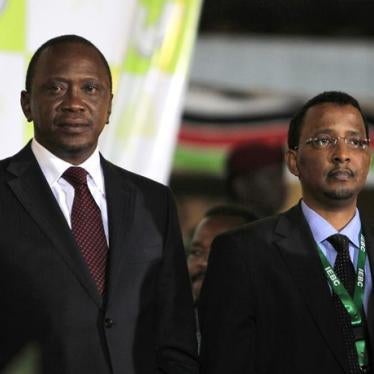(Nairobi) – Kenya made little progress on core reforms in 2013, Human Rights Watch said today in its World Report 2014. At year’s end parliament considered a slew of laws that would restrict independent media and nongovernmental groups, increase police powers, and strengthen executive control, in violation of Kenya’s 2010 constitution.
There was no move toward justice for victims of longstanding patterns of human rights violations by police, including extrajudicial killings, “enforced disappearances,” torture, and other abuses. Police were implicated in serious crimes throughout the year, including arbitrary arrests; rape and torture of Somali refugees; the use of excessive force against protesters in Kisumu; and killings and “disappearances” of several Muslim clerics and associates in Mombasa.
“The year 2013 should have been positive for Kenya after the relatively peaceful general election in March,” said Daniel Bekele, Africa director at Human Rights Watch. “But the new government hasn’t taken a single step to make the police and politicians more accountable to the public or even to stop extrajudicial killings by police, and its move to restrict media and independent groups is ominous.”
In the 667-page world report, its 24th edition, Human Rights Watch reviews human rights practices in more than 90 countries. Syria’s widespread killings of civilians elicited horror but few steps by world leaders to stop it, Human Rights Watch said. A reinvigorated doctrine of “responsibility to protect” seems to have prevented some mass atrocities in Africa. Majorities in power in Egypt and other countries have suppressed dissent and minority rights. And Edward Snowden’s revelations about US surveillance programs reverberated around the globe.
The March elections proceeded relatively peacefully, despite fears that they would plunge Kenya into another bout of the violence that engulfed the country in 2007-2008. President Uhuru Kenyatta and his deputy, William Ruto, face charges of crimes against humanity at the International Criminal Court (ICC) in connection with the 2007-2008 violence.
They had pledged to continue cooperating with the ICC, but once in power, the government opened a campaign to have their cases deferred, referred to local mechanisms, or terminated. Kenyatta and Ruto, however, have appeared before the ICC voluntarily when required to do so. Ruto’s trial began in September 2013 while Kenyatta’s trial is scheduled to begin in February 2014.
Human rights defenders and activists advocating for justice for the 2007-2008 post-election violence experienced increasing pressure, threats, and intimidation during 2013, Human Rights Watch said. During their election campaigns, Kenyatta and Ruto accused activists of manufacturing evidence against them and coaching witnesses in the ICC cases.
Although there has been progress in reforming the judiciary, the electoral system, and parliament, police reforms have lagged, Human Rights Watch said. While key civilian oversight mechanisms were created, there were delays in restructuring the police service and vetting officers to remove those implicated in rights violations. “Police killings and other crimes are rarely investigated, and those responsible are never held to account,” Bekele said. “The government should support strong independent oversight to break this pattern instead of weakening effort to stop this cycle of impunity.”






